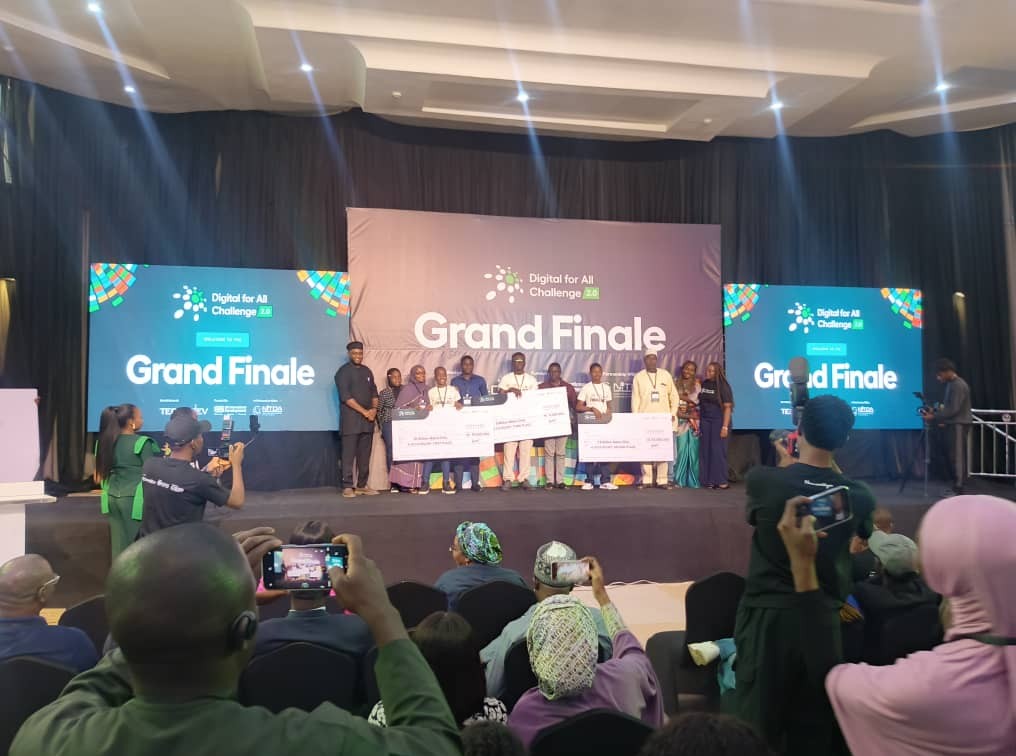The Federal Government is planning to achieve 95% digital literacy among Nigerians by 2030, with a specific target of training and empowering at least 30 million citizens by 2027.
The Director-General of the National Information Technology Development Agency (NITDA), Kashifu Abdullahi, represented by the agency’s Director of Stakeholder Management, Aristotle Onumo, made this known on Thursday in Abuja at the Grand Finale of the Tech4Dev Digital for All Challenge 2.0.
Abdullahi explained that NITDA is driving the initiative through strategic partnerships, particularly with the National Youth Service Corps (NYSC) and educational institutions nationwide.
“The DFA 2.0 competition aligns with NITDA’s vision. Our aim is to ensure that 95% of Nigerians are digitally literate by 2030. By 2027, we want to see 30 million Nigerians trained and digitally empowered. We cannot do this alone, which is why we are working with partners,” he said.
Highlighting the role of NYSC, Abdullahi noted that the agency trains corps members as Digital Literacy Champions who are deployed nationwide.
“Currently, in every local government area of Nigeria, there are Digital Literacy Champions training citizens. Our portal also provides real-time data on the number of Nigerians trained so far,” he added.
He further revealed that NITDA, in collaboration with the Ministry of Education, has successfully integrated digital literacy into the national curriculum at all levels of education.
Abdullahi said civil servants are also being targeted to ensure efficiency and effective service delivery.
“For civil servants, digital literacy is now a compulsory component of promotion examinations. This is another step towards achieving our target of a digitally literate nation by 2027,” he stated.
The NITDA boss commended Tech4Dev for its collaboration, describing the Digital for All Challenge as a “shared vision.”
“We believe that digital literacy is the new currency of the 21st century. With the right digital skills, we are laying the foundation for innovation, job creation and sustainable prosperity. Partnerships like this are vital because 400 NITDA staff alone cannot reach 270 million Nigerians,” he said.
Abdullahi congratulated the winners of the challenge, urging them to see the competition as a tool for transformation rather than just a contest.
“This is not merely a competition but a transformation. The young innovators we celebrate today are embracing digital skills as tools for empowerment and nation-building. The future is not something we wait for; it is something we create through knowledge, courage and collaboration,” he remarked.
Similarly, the UK International Development Digital Access Programme Adviser and Africa Cyber Programme Country Lead, Idongesit Udoh, praised the initiative as “a really significant digital-for-all challenge,” describing it as a landmark project that has expanded access to digital skills nationwide.
Udoh emphasised that digital access is essential to ensure that no one is left behind in the digital age.
“Skills, connectivity and trust are the foundations of a modern digital economy, and this project has advanced all three across the country,” he said.
Co-founder of Tech4Dev, Oladiwura Oladepo, highlighted the impact of the Digital for All Challenge, noting that the first edition directly benefited nearly 18,000 Nigerian youths.
She explained that the second edition was designed to deepen digital literacy, empower individuals and unlock opportunities for Nigerians across diverse groups, ages and classes.
These included young learners aged 8–18 in the K-12 category; the Youth Basic category for beginners; the Youth Intermediate category, where participants explored fields such as cybersecurity, product design, data analysis, digital and social media marketing, and software development; as well as a dedicated Civil Servants category aimed at boosting digital capacity among government workers for more effective service delivery.
“This programme has impacted Nigerians at every level, equipping them with the skills needed to thrive in a technology-driven world. Today, I can proudly say that we have come a long way in fulfilling that vision. Over one million Nigerians have been reached at different stages of this challenge through awareness campaigns, training sessions, assessments and competitions,” Oladepo said.
The competition featured participants from all six geopolitical zones of the country. Winners received substantial cash prizes. The overall winner, Miracle Michael, received ₦15 million; Chinedu Arisa, the second prize winner, received ₦12.5 million; Ismail Adam was awarded ₦10 million; while Uluchi Chibueze received ₦7.5 million.
Get passive updates on African tech & startups
View and choose the stories to interact with on our WhatsApp Channel
Explore




